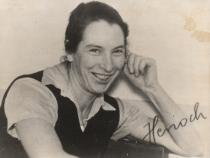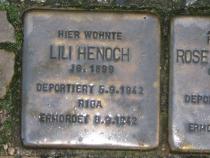Location
Treuchtlinger Str. 5
Historical name
Haberlandstr. 11
District
Schöneberg
Stone was laid
05 July 2008
Born
26 October 1899 in Königsberg / Kaliningrad
Occupation
Sportlehrerin
Forced Labour
Arbeiterin (dem Landwerk Neuendorf)
Deportation
on 05 September 1942
to
Riga
Murdered
08 September 1942 in Riga
Lilli Henoch was one of the best known German sportswomen of the Weimar Republic. Born Lilli Margarethe Rahel Henoch into a haute-bourgeois family on 26 October 1899 in Königsberg (today Kaliningrad), she was the second daughter of merchant Leo Henoch and his wife Rose. Her older sister Suse was born in 1898; her younger brother Max was born in early 1910. Two years later, in 1912, their father died. In 1919 his young widow moved to Berlin with her children. Here she married the insurance company director Mendel Mendelsohn. Lilli and her mother, stepfather and siblings moved into a spacious apartment at Haberland Strasse 11 (today Treuchtlinger Strasse 5) in the Bayrisches Viertel area of Berlin.
According to her sister, Lilli was passionate about sports from a very young age. Soon after arriving in the city, she joined the Berlin sports club (BSC). It had recently opened a ladies’ section and was one of the most renowned sporting associations in Germany. This marked the beginning of the young sportswoman’s unparalleled career, which took her to the very top of her profession and made her a leading figure in German women’s sport. As early as 1921 the Berlin sports club awarded her its highest distinction, the “golden eagle”, the club’s emblem. She was the first woman to be honoured in this way. Lilli Henoch was an extraordinarily successful member of the club: Between 1922 and 1926, she won the German championship title ten times in the disciplines shot-put, discus, long jump and the BSC’s 4 x 100 metres relay. She set four world records and also excelled in the team sports hockey and handball. Alongside her sporting activities, she assumed an increasing number of voluntary tasks for the BSC. In January 1933, shortly before the Nazis’ came to power, she was elected chairperson of the entire ladies’ track and field athletics division. But she did not have much time to enjoy her success: Lilli Henoch was Jewish and therefore debarred from the association, despite all she had done for it, in August the same year.
In order to stay in sports, she joined the Jewish gymnastics and sports club “1905”. Here she built up a handball team which became one of the best in the Jewish sports world under her direction. She received offers to work as a trainer in the United States and the Netherlands but turned them down.
From 1933 she worked as a gymnastics teacher at the Jewish primary school in Ryke Strasse (Prenzlauer Berg). She was one of the few qualified gymnastics teachers at that time and for a long period the only professional specialist at the school. Initially she taught both boys and girls. But as ever more Jewish children were barred from state schools, the number of pupils at the Ryke Strasse school grew and an additional sports teacher was employed to instruct the boys.
Once a year, a national sports festival was held on the Jewish Community’s sports ground in Grunewald, which was very popular with children and parents alike. With her excellent qualifications and long-term experience, Lilli Henoch played a leading role in its preparation and organisation for many years, until 1938. After the November pogrom, the sports ground was confiscated and the Jewish Community was no longer able to use it. Lilli Henoch continued to work as a sports teacher at the school in Ryke Strasse until its closure on 30 June 1942. She subsequently became a harvest worker at the immigrants’ training estate Neuendorf near Fürstenwalde, which by that time had been placed under the control of the SS. She still lived with her mother. From May 1941, they were subtenants of Frau Askenaze in a Jews’ apartment at Kleist Strasse 36. Before moving there, they had been forced to share their apartment in the Bayrisches Viertel area with four Jewish subtenants under the law on tenancies of Jews of 30 April 1939.
In summer 1942, Lilli Henoch and her mother Rose received the order to “evacuate”. In a declaration of assets that Lilli Henoch signed on 26 August 1942, she stated that her last occupation was “harvest worker in Neuendorf”. On 5 September 1942 she and her mother were deported on the 19th “transport to the East” to Riga. The journey in a livestock wagon lasted three days. Lilli Henoch and her mother Rose were murdered on arrival.
Lilli Henoch’s younger brother Max was deported on 19 April 1943 to Auschwitz. He died on 2 April 1945 in Buchenwald concentration camp. Their older sister Suse was the only one of the family to survive the Nazi era. She had emigrated to Romania in time.
According to her sister, Lilli was passionate about sports from a very young age. Soon after arriving in the city, she joined the Berlin sports club (BSC). It had recently opened a ladies’ section and was one of the most renowned sporting associations in Germany. This marked the beginning of the young sportswoman’s unparalleled career, which took her to the very top of her profession and made her a leading figure in German women’s sport. As early as 1921 the Berlin sports club awarded her its highest distinction, the “golden eagle”, the club’s emblem. She was the first woman to be honoured in this way. Lilli Henoch was an extraordinarily successful member of the club: Between 1922 and 1926, she won the German championship title ten times in the disciplines shot-put, discus, long jump and the BSC’s 4 x 100 metres relay. She set four world records and also excelled in the team sports hockey and handball. Alongside her sporting activities, she assumed an increasing number of voluntary tasks for the BSC. In January 1933, shortly before the Nazis’ came to power, she was elected chairperson of the entire ladies’ track and field athletics division. But she did not have much time to enjoy her success: Lilli Henoch was Jewish and therefore debarred from the association, despite all she had done for it, in August the same year.
In order to stay in sports, she joined the Jewish gymnastics and sports club “1905”. Here she built up a handball team which became one of the best in the Jewish sports world under her direction. She received offers to work as a trainer in the United States and the Netherlands but turned them down.
From 1933 she worked as a gymnastics teacher at the Jewish primary school in Ryke Strasse (Prenzlauer Berg). She was one of the few qualified gymnastics teachers at that time and for a long period the only professional specialist at the school. Initially she taught both boys and girls. But as ever more Jewish children were barred from state schools, the number of pupils at the Ryke Strasse school grew and an additional sports teacher was employed to instruct the boys.
Once a year, a national sports festival was held on the Jewish Community’s sports ground in Grunewald, which was very popular with children and parents alike. With her excellent qualifications and long-term experience, Lilli Henoch played a leading role in its preparation and organisation for many years, until 1938. After the November pogrom, the sports ground was confiscated and the Jewish Community was no longer able to use it. Lilli Henoch continued to work as a sports teacher at the school in Ryke Strasse until its closure on 30 June 1942. She subsequently became a harvest worker at the immigrants’ training estate Neuendorf near Fürstenwalde, which by that time had been placed under the control of the SS. She still lived with her mother. From May 1941, they were subtenants of Frau Askenaze in a Jews’ apartment at Kleist Strasse 36. Before moving there, they had been forced to share their apartment in the Bayrisches Viertel area with four Jewish subtenants under the law on tenancies of Jews of 30 April 1939.
In summer 1942, Lilli Henoch and her mother Rose received the order to “evacuate”. In a declaration of assets that Lilli Henoch signed on 26 August 1942, she stated that her last occupation was “harvest worker in Neuendorf”. On 5 September 1942 she and her mother were deported on the 19th “transport to the East” to Riga. The journey in a livestock wagon lasted three days. Lilli Henoch and her mother Rose were murdered on arrival.
Lilli Henoch’s younger brother Max was deported on 19 April 1943 to Auschwitz. He died on 2 April 1945 in Buchenwald concentration camp. Their older sister Suse was the only one of the family to survive the Nazi era. She had emigrated to Romania in time.




